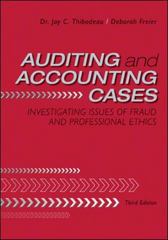The audit committee of the board of directors at WorldCom had ultimate responsibility for ensuring that the
Question:
The audit committee of the board of directors at WorldCom had ultimate responsibility for ensuring that the company’s systems of internal controls were effective. The internal audit department periodically gathered information relating to aspects of the company’s operational and financial controls and reported its findings and recommendations directly to the audit committee.
Dick Thornburgh, WorldCom’s bankruptcy court examiner, wrote in his second interim report released on June 9, 2003, that “the members of the Audit Committee and the internal audit department personnel appear to have taken their jobs seriously and worked to fulfill their responsibilities within certain limits.”1 However, the bankruptcy court examiner also wrote that he found a number of deficiencies in both the internal audit department and the audit committee. Among the issues the bankruptcy court examiner noted in the internal audit department were as follows: its relationship with management, lack of budgetary resources, lack of substantive interaction with the external auditors, and its restricted access to relevant information.2 The bankruptcy court examiner found that WorldCom’s internal audit department focused its audits primarily on the areas that were expected to yield cost savings or result in additional revenues.3 In planning its audits, the department did not seem to conduct any quantifiable risk assessment of the weaknesses or strengths of the company’s internal control system. In addition, the examiner found that the department’s lack of consultation with WorldCom’s external auditor, Arthur Andersen, resulted in even further audit coverage gaps.4 Internal Audit Department’s Relationship with Management The SEC’s investigation revealed that management’s influence over the activities of the internal audit department may have superseded those of the audit committee. It appeared that management was able to direct the internal audit department to work on audits not previously approved by the audit committee and away from other audits that were originally scheduled. At most, it appears that the audit committee was advised of such changes after the fact.5 Although the audit committee annually approved the audit plans of the internal audit department, it seemed to have had little input into the development of the scope of each audit or the disposition of any findings and/or recommendations.
The audit committee also did not seem to play any role in determining the day-to-day activities of the internal audit department. Rather, the CFO appeared to provide direction over the development of the scope of the department’s audit plans, the conduct of its audits, and the issuance of its conclusions and recommendations.
The CFO also oversaw all personnel actions for the department, such as promotions and increases in salaries, bonuses, and stock options granted.6 The internal audit department distributed preliminary drafts of its internal audit reports to CFO Scott Sullivan and at times to CEO Bernie Ebbers. The internal audit department also distributed preliminary drafts of its reports to the management that was affected by a particular report. All people on the distribution list provided their input on the conclusions and recommendations made in the reports. In contrast, the audit committee did not receive any preliminary drafts of the internal......
Case Questions
1. Based on your understanding of WorldCom’s internal audit department, do you believe that the department could have been helpful in the internal control process at WorldCom? Why or why not?
2. Based on the case information, do you believe that WorldCom’s audit committee was effective in its management of the internal audit department? Why or why not?
3. Do you believe that auditors should be allowed to use the work of other professionals as evidence to support their own internal control audit opinion? Why or why not?
4. What factors must the external auditor consider before using the work of other professionals as evidence to support an internal control opinion? Please be specific.
Step by Step Answer:

Auditing And Accounting Cases Investigating Issues Of Fraud And Professional Ethics
ISBN: 9780078110818
3rd Edition
Authors: Jay Thibodeau, Deborah Freier





